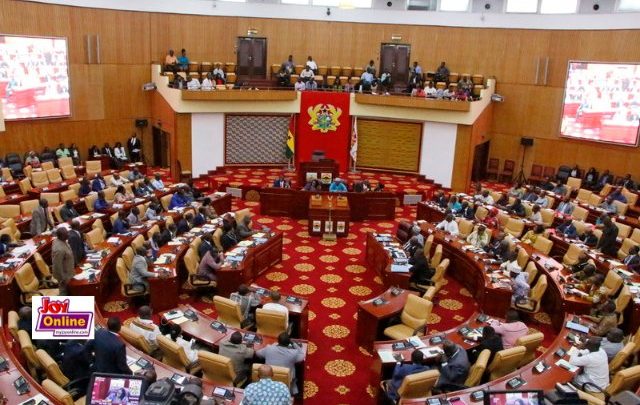Life StyleNews
More MPs to lose seats; but Parliament rejects survey

About 49.5 per cent of Ghanaians will vote out their Members of Parliament (MPs) over poor performance if elections were held today, a new survey report has revealed.
The survey, conducted by the Political Science Department at the University of Ghana, had 42.6 per cent of the respondents ready to retain their lawmakers with 7.9 per cent of respondents still undecided.
Also, a majority of the respondents representing 46.7 per cent do not want their incumbent MPs to contest in the 2020 general election while 42.4 per cent want their MPs to contest with 10.9 per cent still undecided on whether their MPs should contest or not.
Regional level
In two regions, 50 per cent or more would vote for the incumbents: Volta (56.4 per cent) & Oti (50.0 per cent), the report said.
“In nine others, 40 per cent or more would vote for the incumbents: Savannah (48.7 per cent), Ashanti (45.7 per cent), Bono East (45.7 per cent), Ahafo (45.5 per cent), Northern (45.3 per cent), Western North (45.2 per cent), Upper West (42.7 per cent), Eastern (41.7 per cent) and Central (40.7 per cent).”
“In the other five, only 30 per cent or more would vote for the incumbents: Western (38.5 per cent) , Bono (35.7 per cent) , Upper East (35.3 per cent), Greater Accra (34.5 per cent) and North East (32.9 per cent).”
“In four regions, more than 10 per cent were undecided: Western North (16.0 per cent), North East (14.1 per cent) Upper East (10.2 per cent) and Savannah (10.0 per cent),” it added.
NPP MPs
The region with the most support for NPP incumbents, if elections were held today, was Oti (66.0 per cent) where NPP has a single seat.
In the three regions where NPP has its highest number of seats, the support for the incumbents was lower: Ashanti-44 seats (45.8 per cent), Eastern-27 seats (42.3 per cent) and Greater Accra-21 seats (31.3 per cent).
In four regions, more than 10 per cent were undecided: Upper East (10.1 per cent), Greater Accra (10.5 per cent), Western North (16.3 per cent) and North East (17.6 per cent)
NDC MPs
The region with the most support for NDC incumbents, if elections were held today, was Ahafo (60.4 per cent) where NDC has two seats.
In the three regions where NDC has its highest number of seats, the support for the incumbents was lower: Volta-18 seats (56.4 per cent), Greater Accra-13 seats (39.5 per cent) and Upper East-12 seats (36.9 per cent).
In five regions, more than 10 per cent were undecided: Upper East (10.1 per cent), North East (10.6 per cent), Eastern (13.1 per cent), Western North (15.9 per cent) and Central (16.2 per cent).
MPs risk losing seats worrying
Meanwhile, an Executive Director of the Parliamentary Network, Africa, Mr Sammy Obeng, has said that the recent research conducted by the Political Science Department at the University of Ghana should be a wake-up call for parliamentarians and Ghanaians.
Speaking on Eyewitness News on Accra-based Citi FM, Mr Obeng said the report was a major cause of alarm, saying, “I think MPs should be extremely worried.
Ghanaians should also be extremely worried. To predict that about 180 MPs risk losing their seats in the upcoming election is a worrying trend.”
“We should be worried.
MPs should start revising their notes on how to create chamber-constituency balance in the work that they do so that no aspect of it suffers going forward.
They (MPs) are penalised for not going to their constituencies but there are structures that have been put in place in Parliament that MPs need to take advantage of to make themselves visible to the constituents.
In this era of technology, they need to make their constituents realise what they are doing as MPs,” he added.
Members of Parliament (MPs) have criticised the methodology used in the research conducted by the Political Science Department of the University of Ghana which predicted that about 180 MPs would lose their seats in the 2020 election due to non-performance.
Speaking separately in Parliament yesterday, the legislators said the methodology used in the research was unfair and could cause some MPs to lose their seats and worsen the attrition rate in the House.
Consequently, the Speaker of Parliament, Professor Aaron Michael Oquaye, has asked the leaders of Parliament to engage the researchers of the University of Ghana and other allied institutions to define the appropriate parameters for assessing MPs.
Prof. Oquaye said he was not against assessing the performance of MPs but indicated that such assessments had to be done on the basis of constitutional requirements on legislators.
Confusion about roles
The Speaker of Parliament said there was a confusion as to the role of MPs, and indicated that such confusion should not emanate from a research institution.
He said it was not the duty of MPs to construct roads, and so for people to say that they would not vote for them because of their inability to construct roads was flawed.
Prof. Oquaye said the MPs worked in the chamber and at committees, adding that the current legislators had passed many bills into law than passed by previous Parliaments.
Besides, the MPs had made statements and got their questions admitted and responded to by ministers, which were part of the records of the legislators.
Concerns
The First Deputy Speaker of Parliament and the New Patriotic Party (NPP) MP for Bekwai, Mr Joseph Osei-Owusu, said it was important for Parliament to collaborate with the research institutions to agree on the areas and parameters for the assessment of the performance of MPs.
Mr Osei-Owusu said institutions could not be barred from assessing the performance of legislators, but indicated that the research had to be done fairly.
In his contribution, the Minority Leader and National Democratic Congress (NDC) MP for Tamale South, Mr Haruna Iddrisu, said Parliament could not interfere with the work of the Political Science Department of the University of Ghana, but indicated that it was important for the department to clearly define who an MP was relative to his or her work.
He said the research findings which stated that 180 MPs would lose their seats due to poor performance had the tendency to cause them their seats as they prepared to go into the primaries.
Mr Iddrisu said Parliament was alarmed at the implication of the findings of the research relative to the high attrition rate in the Legislature.
He suggested that Parliament should constitute a special committee to further engage with the researchers to discuss what the findings were, the basis for the findings and how they arrived at the conclusion.
Source: Graphic.com.gh



